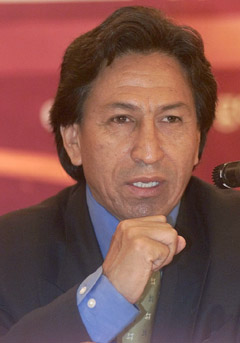Alejandro Toledo

by Beth Rowen |
 Peruvian President Alejandro Toledo. (Source/AP) Related Links |
ALEJANDRO TOLEDO was elected president of Peru in June 2001, narrowly defeating former President Alan García.
With 75% of the votes counted, Toledo garnered 51.99% of the vote to Garcia's 48.01%.
The campaign was hostile from the outset, with García capitalizing on media reports that Toledo used cocaine, cavorted with prostitutes, and abandoned a child he fathered in an extramarital affair. Toledo, who denied the accusations, responded by depicting García's presidency as one marred by corruption, hyperinflation, terrorism, and food shortages.
It was Toledo's second presidential race in just 13 months. Last year he ran against incumbent Alberto K. Fujimori. Toledo dropped out of the runoff election amid widespread allegations that the election was rigged in Fujimori's favor. Months after being reelected, Fujimori fled to his native Japan and resigned via fax after the broadcast of Fujimori's chief spy, Vladimiro Montesinos, evidently bribing an opposition congressman to switch parties.
Rags-to-Riches
In his first run, Toledo's rag-to-riches story made him a darling in the press, as well as among urban lower-class voters who look to him as a role model. In addition, his distinct Indian features and mixed heritage as a cholo—part Indian and part Latino—have widely appealed to Peruvians who share the same ancestry. But recently his image has been tarnished by the reports of his scandalous personal life.
One of 16 children, Toledo was born and raised in the grimy port village of Chimbote. His father was a bricklayer and his mother sold fish at markets, and he himself worked as a shoeshine boy. At age 16, with the guidance of members of the Peace Corps, Toledo enrolled at the University of San Francisco on a one-year scholarship. He continued his education, obtaining a partial soccer scholarship and making up the difference by pumping gas.
In addition to two masters degrees, he earned a Ph.D. in economics from Stanford, where he met his wife, Elaine Karp, a Belgian-born American anthropologist. Currently a business-school professor, Toledo previously served as chief economic adviser to the president of the Central Bank and minister of labor under President Fernando Belaúnde. He also did a stint at the World Bank.
On the stump, like the most experienced politicians, Toledo knows how to work a crowd, whether addressing peasants or potential foreign investors. Seamlessly transitioning from a buttoned-down, eloquent economist to a rebel outfitted in jeans, a t-shirt, and a bandana, Toledo is well versed in international trade and promises to give voice to the labor movement.
Mostly, though, Toledo has preached a centrist platform, pledging to award small-business loans to farmers, balance the budget, lure foreign investment, and create jobs. Toledo's moderate campaign and carefully selected issues have found broad appeal.
Getting elected was the easy part; Toledo, with barely a mandate, now faces the daunting task of shoring up the lagging economy, creating jobs, and aiding desperate farmers.







